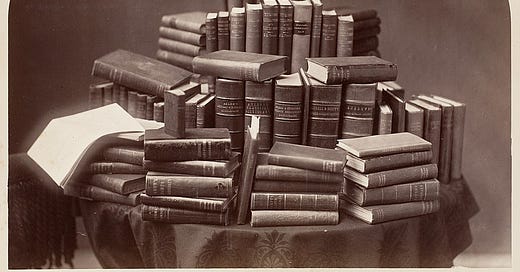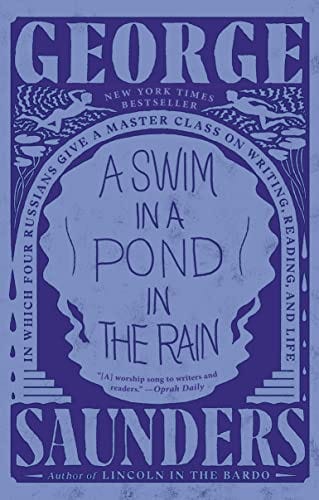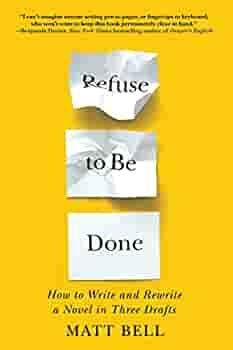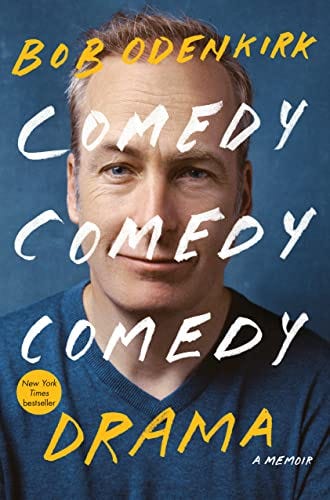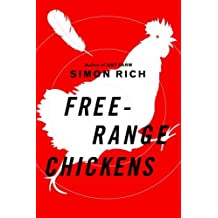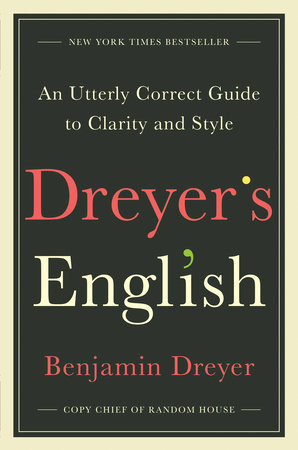I love reading, which means I constantly have books to recommend… mostly to people who do not want the recommendation at all. They’ll smile and say, “Oh yeah, I’ll have to check that out,” but it turns out they don’t “have to check that out,” as evidenced by the fact that they never do. Still, I keep recommending and they keep nodding! And now, this terrible conversation is a terrible post!
This isn’t a “Best of” list, just a short list of books that I’ve read and found valuable as a writer who also likes sketch.
A Swim in a Pond in the Rain, by George Saunders
I’ve recommended this book to all of my writer friends. Is this the best book on writing I’ve ever read? Possibly! It was definitely the book I needed to read when I read it.
Most writing books are strident and proscriptive, but the overall tone of this one is refreshingly enthusiastic. Saunders guides the reader through a series of valuable writing lessons by analyzing Russian short stories, and does so with a palpable sense of enthusiasm for the material and the process of creating stories.
Russian short stories from the nineteenth century might seem to be the exact opposite of modern sketch comedy, but there are some insights about writing that apply to any form. And there are even some lessons on comedy in here! Though Saunders doesn’t use these terms specifically, he talks about lampshading and establishing a base reality while analyzing Nikolai Gogol’s The Nose.
The inclusion of the short stories themselves also makes this the rare writing book that’s even more rewarding on a second read. Highly recommended!
Refuse to Be Done, by Matt Bell
The dearth of sketch-specific writing books means this is another book about writing something else (novels), but it has practical writing advice that can easily be applied to sketch.
Bell’s book is specifically focused on revision and editing, a topic that many other writing books relegate to a sad, small chapter in the back. It’s a valuable focus: that next draft is where you make a bad thing good, and it can sometimes take as long as writing the first draft. Why not spend more time delving into the editing process?
Bell’s process of exploration, drafting, and increasingly nit-picky revisions very neatly mirrors the process of sketch writing. He also talks about things like rhythm, word choice, and clarity, which are essential aspects of any writing, but especially important if you’re trying to make a joke explosively funny. Some parts of this book won’t apply to someone who writes sketch exclusively, but there’s enough good advice in here that I think it’s worth reading.
Comedy Comedy Comedy Drama by Bob Odenkirk
This is a memoir of Bob Odenkirk’s career. If you’re reading this newsletter, you’re certainly familiar with Odenkirk and his work. What I loved most about this book was how clearly his passion for sketch shines through. Sketch is so often ignored and unloved, at best a stepping stone to something “better,” at worst improv’s even weirder cousin, who should be shunned and mocked. But Odenkirk clearly cares about sketch and has thought a lot about what makes it work (and, in the case of his experience with SNL, what makes it fail). There are a lot of personal stories in here, as you would expect from a memoir, but also a lot about comedy, acting, writing and trying to make a career out of entertainment.
Various Books by Simon Rich
I’m cheating with this entry because this is actually several books. And, once again, it’s not sketch, but Simon Rich’s short comedy essays are about as close as you can get to sketch in prose form. Early works like Ant Farm and Free Range Chickens are particularly sketch-y, filled with short pieces built on strong premises. These are breezy, funny stories that are also perfect examples of strong games that continue to heighten and surprise. Later books like Hits and Misses are a little more prose-y, but are still built on relatable premises with heightened comedic twists.
Dreyer’s English by Benjamin Dreyer
This is a reference manual that I don’t think is intended to be read end to end… but I read it end to end anyway. It’s a good, modern grammar guide for people who might be more okay with a singular “they” than the stuffy old grammarians of yesteryear. It’s also good for those who worry their grammar skills are a little rusty, and for perfectionists who want to be aware of potential mistakes they might not even think to look for. Do you know for sure if Peter Pan’s fairy companion spells her name as one word or two? Well, it’s two: Tinker Bell — her occupation and the sound she makes. A handy little guidebook for the more modern pedant.
